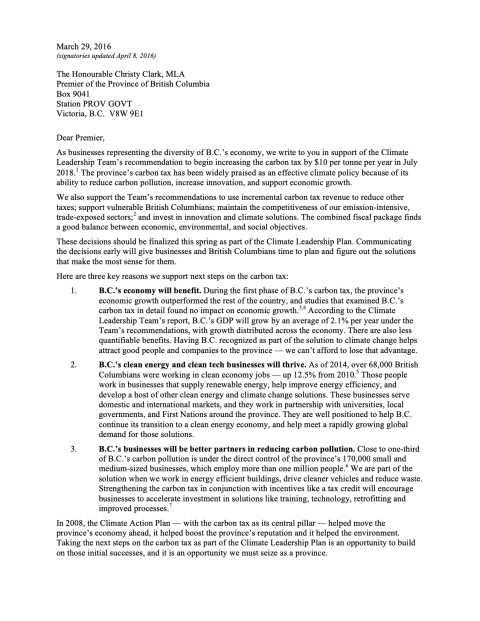More than 160 B.C. businesses have signed the following open letter calling on the B.C. government to commit to strengthening the province’s carbon tax as part of the Climate Leadership Plan, due out this spring.
The Board of Change, Clean Energy BC, Climate Smart Businesses Inc., Pembina Institute and Clean Energy Canada initiated the letter.
March 29, 2016
(signatories updated April 8, 2016)
The Honourable Christy Clark, MLA
Premier of the Province of British Columbia
Dear Premier,
As businesses representing the diversity of B.C.’s economy, we write to you in support of the Climate Leadership Team’s recommendation to begin increasing the carbon tax by $10 per tonne per year in July 2018.[1] The province’s carbon tax has been widely praised as an effective climate policy because of its ability to reduce carbon pollution, increase innovation, and support economic growth.
We also support the Team’s recommendations to use incremental carbon tax revenue to reduce other taxes; support vulnerable British Columbians; maintain the competitiveness of our emission-intensive, trade-exposed sectors;[2] and invest in innovation and climate solutions. The combined fiscal package finds a good balance between economic, environmental, and social objectives.
These decisions should be finalized this spring as part of the Climate Leadership Plan. Communicating the decisions early will give businesses and British Columbians time to plan and figure out the solutions that make the most sense for them.
Here are three key reasons we support next steps on the carbon tax:
- B.C.’s economy will benefit. During the first phase of B.C.’s carbon tax, the province’s economic growth outperformed the rest of the country, and studies that examined B.C.’s carbon tax in detail found no impact on economic growth.[3],[4] According to the Climate Leadership Team’s report, B.C.’s GDP will grow by an average of 2.1% per year under the Team’s recommendations, with growth distributed across the economy. There are also less quantifiable benefits. Having B.C. recognized as part of the solution to climate change helps attract good people and companies to the province — we can’t afford to lose that advantage.
- B.C.’s clean energy and clean tech businesses will thrive. As of 2014, over 68,000 British Columbians were working in clean economy jobs — up 12.5% from 2010.[5] Those people work in businesses that supply renewable energy, help improve energy efficiency, and develop a host of other clean energy and climate change solutions. These businesses serve domestic and international markets, and they work in partnership with universities, local governments, and First Nations around the province. They are well positioned to help B.C. continue its transition to a clean energy economy, and help meet a rapidly growing global demand for those solutions.
- B.C.’s businesses will be better partners in reducing carbon pollution. Close to one-third of B.C.’s carbon pollution is under the direct control of the province’s 170,000 small and medium-sized businesses, which employ more than one million people.[6] We are part of the solution when we work in energy efficient buildings, drive cleaner vehicles and reduce waste. Strengthening the carbon tax in conjunction with incentives like a tax credit will encourage businesses to accelerate investment in solutions like training, technology, retrofitting and improved processes.[7]
In 2008, the Climate Action Plan — with the carbon tax as its central pillar — helped move the province’s economy ahead, it helped boost the province’s reputation and it helped the environment. Taking the next steps on the carbon tax as part of the Climate Leadership Plan is an opportunity to build on those initial successes, and it is an opportunity we must seize as a province.
Sincerely,
1660 East Broadway Holdings Ltd
275 Lansdowne Street Ltd
3106 Cambie Street Ltd
977 Fort Street Ltd
Acme Systemic Results
Acuere Consulting Inc.
AdapTech Solutions Ltd.
Aeolis Wind Power
Alca Consulting Inc.
Altaqua Hydroenergy Corp
Alterra Power Corp.
ARYZTA Canada
ATD Waste Systems Inc.
Avalon Mechanical Consultants Ltd.
Avid Consulting Group Ltd.
B. Small Enterprises Ltd
Bandidas Taqueria
BC Bioenergy Network
Bear Claw Lodge
Blue Fuel Energy
Bluefin Electric Marine Inc.
Board of Change
Boldt Communications Inc.
Boralex
Bruce Haden Architect Ltd.
Bullfrog Power
Canada Ticket Inc.
Canadian Electric Vehicles ltd
Canadian Hydrogen and Fuel Cell Association
Carbon Engineering
Carbon Free Group
Cascadia Instrumentation Inc.
Chinook Power Corp.
Clean and Green Carpets
Clean Energy BC
Climate Smart Businesses Inc.
Communities + Architecture Inc.
Compass Resource Management
Conversations for Responsible Economic Development
Dageraad Brewing
Dakota Projects Ltd
Dawn Chorus Bed & Breakfast
Demand Side Energy
DL Safety Consulting Ltd.
DMC Associates
Dovetail Consulting Group
Dudoc Vancouver
Duvon Holdings Ltd
Dysco Services Ltd.
E-Factor Engineering, Incorporated
Eagle Wing Tours
Earthvoice Strategies Inc.
EasySun Powergrids Inc.
Ebbwater Consulting
eco-Options Energy Cooperative
Ecofish Research
Ecotrust Canada Capital
Emergent Waste Solutions Inc.
Energy Revolution Services
EnerSys Analytics Inc.
EnviroMez Services
ESSA Technologies Ltd.
Etalim Inc
Ethical Bean Coffee
Fairware
False Creek Collision
Farallon Consultants Limited
Fenix Energy
Festival Cinemas Ltd.
Focal Engineering Inc.
GeaZone
Ghost Films Inc.
Global Unicycle Creative Inc
Green Chamber of Commerce BC
Green Sky Sustainability Consulting Inc.
Greenworx Consulting
Growing City
GrowOya.com
GW Solutions
Harvey McKinnon Associates
HASTe Worker's Cooperative
Hemlock Printers Ltd.
Hydrogen Technology & Energy Corporation
Inland Comfort Air Conditioning Ltd.
Innergex Renewable Energy Inc.
Integral Group
International Web Express
Inventys Thermal Technologies Inc.
James Glave Communications
Jinzi Investments Ltd.
Julian Griggs & Associates Ltd
Kambo Green Solutions Inc.
Kisik Aerial Survey
Kispiox Fishing Company
Kispiox Valley Ventures
Kootenay Country Store Co-operative
Kumu Agency
Lanefab Design / Build
Light House Sustainable Building Centre
Liquid Elements Contracting
Mazzi Consulting Services
McCullough Coach Lines Ltd.
MediData Design Inc.
Mills Office Productivity
MK Ince & Associates
Modo Car Coop
Mountain Equipment Co-op (MEC)
Murray McFadden MD Inc
MyKiss Guiding Services
Naikun Wind Energy Group
NEI Investments
Nexterra
Northwest Hydraulic Consultants Ltd.
Novex Delivery Solutions
Perkins+Will
Pinna Sustainability
Praxispoint Consulting Group
Pure Industrial Real Estate Trust
PW Trenchless Construction Inc.
Rangate North Woodworking Solutions Inc.
RDC Fine Homes
RE Consulting Canada
Realize Strategies Co-operative
Recollective Consulting
Recycling Alternative
REDE ENERGY SOLUTIONS, LTD
Reeve Consulting
Reliable Controls Corporation
Renewable Power Corp.
Renewal Funds
Responsible Investment Association
S2G Biochemicals
Salt Spring Consulting Ltd
Schein Foundation
Sea Breeze Power Corp.
Sensible Building Science
SES Consulting
SFU Community Trust
Sharp Six Services
Shift Delivery
Spa Utopia Health and Wellness centre
space2place
SPUD.ca
Starr Schein Enterprises Incorporated
Stone Event Imports, Ltd.
Strandberg Consulting Inc.
Strathcona Business Improvement Association
Sun Bright Solar Inc.
Super Grocer & Pharmacy
Sustainability Solutions Group
Sustainability Ventures
Swift Creek Consulting
Swiss Solar Tech Ltd.
Switch Materials Inc.
The Cleaning Solution
The Kerrisdale Lumber Company
Transom Enterprises
Travesia Partners
Umbrella Property Services
Vancouver Economic Commission
Vancouver Renewable Energy
Vanterre Projects Corp
VeloMetro Mobility Inc.
Walas Concepts
WEBIR Automation and Control Services Ltd
Westpark Electric Ltd.
cc: Minister of Community, Sport and Cultural Development Peter Fassbender
Minister of Energy and Mines Bill Bennett
Minister of Environment Mary Polak
Minister of Finance Mike de Jong
Minister of Jobs, Tourism and Skills Training Shirley Bond
Minister of Natural Gas Development Rich Coleman
Minister of Transportation and Infrastructure Todd Stone
Parliamentary Secretary Jordan Sturdy
Notes
[1] The Climate Leadership Team’s recommendations are available here: bit.ly/1OvykvE. The Team recommended that the annual $10 per tonne increases continue for five years, at which point it would be reviewed. The rate schedule was selected because it helped achieve the economic, social and environmental components of the Team’s mandate.
[2] The recommendation to use a portion of carbon tax revenue to maintain the competitiveness of emissions-intensive, trade-exposed sectors was only intended for situations when those sectors were at an economic disadvantage because B.C.’s climate policy was stronger than its competitors. Furthermore, any support for those sectors was supposed to be designed in a way to avoid undermining the incentive to reduce carbon pollution.
[3] Stewart Elgie, “Just the facts: Did the carbon tax shift burden or buoy B.C.’s economy?,” Sustainable Prosperity, July 9, 2014. bit.ly/21G6t1R
[4] Brian C. Murray and Nicolas Rivers, B.C.’s Revenue Neutral Carbon Tax: A Review of the Latest “Grand Experiment” in Environmental Policy (Sustainable Prosperity, 2015). bit.ly/1dA74Ou
[5] Pacific Coast Collaborative, West Coast Clean Economy: 2010-2014 Jobs Update (2015). http://bit.ly/1PZ6vyS
[6] Climate Smart calculations based on B.C.’s Community Energy and Emissions Inventory (2012), Statistics Canada’s Canadian Business Counts (2015), and ICBC vehicle counts.
[7] Research conducted by the SFU School for Public Policy for Climate Smart, showed that targeted incentives like an investment tax credit could help small and medium businesses cut their carbon pollution. In a November 2, 2015 letter to Minister of Environment Mary Polak, Climate Smart provided analysis of the potential impact of an investment tax credit. “If one third of them apply for the tax credits, preliminary estimates indicate B.C. could reduce carbon pollution by 1.2 million tonnes annually by 2020. This would yield annual operating savings to those businesses of half a billion dollars.”
Press
Since its release on March 30, 2016, the open letter has received coverage from many media outlets.
As well, the open letter was reposted on Medium and Rabble.
Further reading
Learn more about the B.C. Climate Leadership Plan process.
- How B.C. premier Christy Clark can avoid “climate laggard” status
- B.C. Climate Leadership Plan submission: Phase 2 consultation
- Premier Clark: Join 'Forces of Yes' on Climate
- Energy Forum letter to Premier Christy Clark on B.C. Climate Leadership Plan
- Webinar series: What’s needed for a strong B.C. Climate Leadership Plan?
- B.C. byelection candidates sound off on the future of the carbon tax
- Want B.C. to be a climate leader again? Now is the time to speak up









